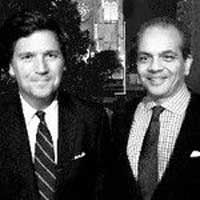It's almost impossible to think of anything as horrifying as a group of innocent young kids gunned down by a madman in their classroom. Just imagining the terror those kids faced is enough to break even the hardest of hearts. That's the horror America is wrestling with today. What to do about it is a harder question.
Many turn immediately to gun control. The problem is there are few if any gun control measures that would likely help very much. America already has more guns than people. Someone who wants one will find one. New laws will not deter those already committed to breaking the law.
Outlawing private gun ownership altogether, confiscating all existing guns and making possession illegal would at least hold the potential of making it more difficult for crazy people to get their hands on one -- but that will never happen in America. There is near total national consensus against an idea that radical. Guns have been part of American culture for centuries. Moreover, the U.S. Supreme Court has already confirmed the right of private law-abiding American citizens to own guns under the Second Amendment to the U.S. Constitution. No matter how much some leftists want it to happen, and no matter what other countries choose to do, in America, the government can't take our guns away. For all these reasons, private gun ownership in America is not going away. That leaves open the question: Is there anything to be done at all?
The key questions in any gun control debate are: No. 1: whether the regulations in question will actually help quell illegal gun violence; and No. 2: how much the regulations will hinder the Second Amendment rights of law-abiding citizens. The reality is there are many left-wing Democrats who would like to ban most private gun ownership. Some have come out and said just that. Gun rights advocates analyze any gun proposal with that in mind. Are there reasonable actions that can and should be taken that would not fundamentally harm law-abiding gun owners? Probably. Many gun owners and Second Amendment activists would consider them if they did not presume bad intentions on the part of those pushing them hardest.
Things like improving the instant background-check system, and even enhancing that system for young gun buyers at a time of a booming mental health crisis among young Americans, may be worth a look. But to pretend that any of that is going to fundamentally change the dynamic is not realistic. Banning certain categories of guns altogether has been tried before. President Bill Clinton's so-called assault weapons ban was in place for years but had no real effect on gun crime. Red-flag laws may offer some promise, but for those who care about Second Amendment rights to agree, there has to be ample due process injected into the process. Democrats have not been willing to debate these things.
If Democrats are serious about wanting these reforms and not just trying to score political points, they should agree to open debates. Debates over legislation in the past ended when Democrats refused Republicans amendments. That reeks of political grandstanding and not serious policymaking and compromise. Finally, all reasonable people should be able to agree that those committing crimes with guns should receive the toughest sentences. Richmond, Virginia's Project Exile in the 1990s was a shining example of the benefits of tougher enforcement of laws against criminals using guns. Gun density in rural America is much higher than it is in cities, but gun crime rates are far lower. This may not directly address the school shooting tragedies; the number of crime-related gun deaths is many factors higher. The easy-on-crime philosophy pushed by many left-wing prosecutors needs to be reversed for this to change.
To deal realistically with the problems facing America, we need to look beyond the gun control debate stalemate. There is a youth crisis in America. Mental health is a key component. Depression and suicide are off the charts; so is drug use. COVID-19 lockdowns and school closures exacerbated all of this. Social media has been a poison for young Americans. These are not peripheral issues. They strike at the heart of the problem.
Guns have been around in abundance in America for decades, but the tragic school shooting phenomena is only now increasing at a rapid pace. Why? Those looking for real solutions need to answer that question. It's much easier to pretend that gun control is the solution. The root causes are harder to understand and resolve. But how much effort has even been made?
The correlation between the youth mental health crisis and the advent of social media is too strong to ignore. The internet has brought many benefits, but for America's kids especially, it's brought depression. The internet has also made it much easier for already troubled kids to find and germinate in the most extreme corners of the web. None of this is easy to solve, but policymakers should at least try. Until they do, we will be caught in a deadlocked cycle between those who, more than anything, want to do away with most lawful gun ownership and those dead set on stopping them. That's not working.
-------------------------
Neil Patel co-founded The Daily Caller, one of America's fastest-growing online news outlets, which regularly breaks news and distributes it to over 15 million monthly readers. Patel also co-founded The Daily Caller News Foundation, a nonprofit news company that trains journalists, produces fact-checks and conducts longer-term investigative reporting. The Daily Caller News Foundation licenses its content free of charge to over 300 news outlets, reaching potentially hundreds of millions of people per month. To find out more about Neil Patel and read features by other Creators writers and cartoonists, visit the Creators website at www.creators.com

















